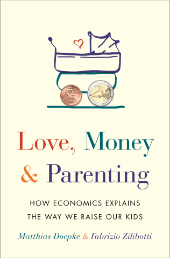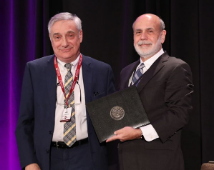2018-2019
August
August 27, 2019
As college seniors, Eli Wallace (Weinberg History '18) and Michael White (Weinberg Econ '18) were out looking for watches one afternoon when they noticed something odd - not a single watch resonated with their preferences.
August 22, 2019
‘Unlearning and discovery’ to improve public policy
August 6, 2019
A Culture of Growth: The Origins of the Modern Economy (Princeton, 2016), by Joel Mokyr, of Northwestern University, is one of those obviously important books that nevertheless hasn’t received the reception it deserves, owing, perhaps, to its daunting erudition; more likely, to readers who thought they already knew the story of how the West grew rich.
August 5, 2019
June, 2019
August 2, 2019
Perth, Western Australia, July 1-3, 2019
July
July 29, 2019 – from The Economist
"A society’s values and beliefs matter for its economy- And cultural change can unlock the economic potential of people and ideas."
July 24, 2019
We hope you enjoy reading our Summer 2019 edition of our Newsletter. This edition includes an update from the Chair, spring event highlights, faculty updates, Ph.D. placements and more!
July 19, 2019 – from Enrico Spolaore, the National Bureau of Economic Research
The book is a significant contribution to the growing literature that links culture and economics. This review discusses Mokyr’s historical analysis in relation to the following questions: What is culture and how should we use it in economics? How can culture explain modern economic growth? Will the culture of growth that caused modern prosperity persist in the future?
June
June 28, 2019
"Our findings suggest that medical factors play a much smaller role in causing U.S. bankruptcies than has previously been claimed. Overemphasizing 'medical bankruptcies' may distract from understanding the true nature of economic hardship arising from high-cost health problems,” wrote researchers of the 2018 study. - The Washington Post
June 24, 2019
The Department of Economics welcomed over 300 graduating students and their families at our Annual Senior Lunch and Awards Ceremony.
June 18, 2019
Bridgette Proctor Heller has more than 30 years of experience as a senior executive with Fortune 500 companies, with an exceptional track record of growing consumer businesses and building highly effective teams.
June 18, 2019
Although uncertainty is a common element of patient care, it has largely been overlooked in research on evidence-based medicine. Patient Care under Uncertainty strives to correct this glaring omission. Applying the tools of economics to medical decision making, Charles Manski shows how uncertainty influences every stage, from risk analysis to treatment, and how this can be reasonably confronted.
June 7, 2019
For the past three years, he served on the three-person organizing committee for the AEA Conference on Teaching and Research in Economic Education (CTREE), which was held in Denver (2017), San Antonio (2018), and St. Louis (2019).
June 4, 2019 – from UCI
We study information as an incentive device in a dynamic moral hazard frame- work. An agent works on a task of uncertain difficulty, modeled as the duration of required effort. The principal knows the task difficulty and can provide information over time with the goal of inducing maximal effort. The optimal mechanism features moving goalposts: an initial disclosure makes the agent sufficiently optimistic that the task is easy in order to induce him to start working. If the task is indeed difficult the agent is told this only after working long enough to put the difficult task within reach. Then the agent completes the difficult task even though he never would have chosen to at the outset. The value of dynamic disclosure implies that principal prefers a random threshold over any deterministic scheme. We con- sider extensions to two-player pre-emption games and bandits.
June 4, 2019
The paper, comparing the fatality risks in United States transportation across modes and over time, may be found here: http://faculty.wcas.northwestern.edu/~ipsavage/436.pdf
May
May 31, 2019 – from Northwestern Magazine
“To be a leader, you’ve always got to be the best team player first,” he says. “And you get to be that best team player when you have the empathy and the drive to understand other people’s perspectives.”
May 21, 2019 – from VOX, with Sergi Basco, Universitat Autònoma Barcelona
Trade in intermediates (or ‘unbundling of production') and trade in capital have become increasingly important in last 25 years. This column shows that trade in intermediates generates a reallocation of capital across countries that exacerbates world inequality in both income and welfare. Unbundling of production hurts middle-income countries but helps those with high productivity. Trade in intermediates also increases within-country inequality, and this increase is U-shaped in the aggregate productivity level of the country.
May 20, 2019 – from The New York Times
You may not like paying taxes, but your burden will be even higher if others don’t pay their fair share. That, in a nutshell, goes a long way toward explaining why a value-added tax, or VAT, is used by just about every major country in the world except the United States.
May 15, 2019
Professor Notowidigdo discussed sport analytics with economics students at the Cubs vs. Brewers game on Friday, May 10.
May 3, 2019
Faculty research fellows (FRFs), who are appointed by the NBER president, also must hold primary academic appointments in North America. They also are recommended by program directors and their steering committees in the culmination of a highly competitive process. Candidates are evaluated based on their research records and their capacity to contribute to the NBER's activities.
April
April 22, 2019
Undergraduate students were treated to an insightful dialogue focused on career advice relating to risk taking, resilience, and perseverance.
April 22, 2019 – from The Daily Northwestern
The 2019 SMILE Spring Showcase variety show was held on April 5-7, with all profits going to Lurie Children’s Hospital.
April 18, 2019 – from Jennifer Zhan/ The Daily Northwestern
As her term comes to a close, ASG president Emily Ash looks back on legacy of space, working with administrators.
April 18, 2019 – from The Washington Post
The great challenge for economists today is to find new and better ways to make their cases, with the goal of kindling a general appreciation of essential economic ideas such as incentives, trade-offs, marginal utility and revealed preferences. Learning to practice the dispassionate analysis of data would be helpful, too. Citizens making informed choices are good for the health of democracy, and lately American democracy has been ailing.
April 11, 2019
April 11, 2019
Kiminori Matsuyama has been named Research Associate of the Center for the Economics of Innovation, headed by Professor Philippe Aghion at the College de France, considered to be France's most prestigious research establishment.
April 11, 2019
The University of Florida Public Utility Research Center prize for the best paper in regulatory economics from the 2019 International Industrial Organization Conference was awarded to Gaston Illanes. The paper that won the award was "Deregulation Through Direct Democracy: Evidence from Liquor Markets", which is coauthored with Sarah Moshary.
April 11, 2019
April 10, 2019 – from The National Bureau of Economic Research
Gordon, with Hassan Sayed, compare and contrast productivity growth up through 2015 starting from 1950 in the U.S. and from 1972 in the EU-10. The analysis focuses on outcomes over four time intervals: 1950-72, 1972-95, 1995-2005, and 2005-15.
April 4, 2019
March
Economics of Running a Restaurant with Professor Hornsten
March 10, 2019

Professor Hornsten took Economics students to Farmhouse restaurant in Evanston to speak with Chef Garrett and learn about the economics of running a restaurant.
March 8, 2019 – from Camilo Castellanos for laSegunda
The interview is in regards to proposed reforms to their pension system.
March 4, 2019 – from The New York Times
Two new studies in economic journals show that inequities in the cash-bail system lead to more long-lasting and pernicious consequences.
March 4, 2019 – from Stanford (SIEPR)
The United States is in the midst of the worst drug epidemic in its history.
February
February 22, 2019 – from Matthias Doepke and Fabrizio Zilibotti for The Washington Post
The greater a country's income inequality, the likelier parents are to push their kids to work hard.
February 22, 2019 – from Paul Kiernan for The Wall Street Journal
She will oversee the team producing analysis and forecasting related to the domestic economy and financial markets.
February 12, 2019 – from Hilary Hurd Anyaso for Northwestern Now
The family, friends, colleagues and former students of the late Dale T. Mortensen, the Ida C. Cook Professor of Economics at Northwestern University and Nobel Laureate, gathered Feb. 1 at the Kellogg Global Hub for the dedication of Mortensen’s Nobel Prize medal, which was donated to the University by the Mortensen family.
February 12, 2019 – from Pamela Druckerman for The New York Times
New research shows that hyper-involved parenting is the route to kids’ success in today’s unequal world.

Matthias Doepke and Fabrizio Zilibotti’s new book: Love, Money, and Parenting: How Economics Explains the Way We Raise Our Kids
February 7, 2019
Parents everywhere want their children to be happy and do well. Yet how parents seek to achieve this ambition varies enormously. For instance, American and Chinese parents are increasingly authoritative and authoritarian, whereas Scandinavian parents tend to be more permissive. Why? Love, Money, and Parenting investigates how economic forces and growing inequality shape how parents raise their children. From medieval times to the present, and from the United States, the United Kingdom, Germany, Italy, Spain, and Sweden to China and Japan, Matthias Doepke and Fabrizio Zilibotti look at how economic incentives and constraints such as money, knowledge, and time influence parenting practices and what is considered good parenting in different countries.
Recent Press:
The Parent Trap
The greater a country's income inequality, the likelier parents are to push their kids to work hard
February 22, 2019 | By Matthias Doepke and Fabrizio Zilibotti | The Washington Post
The Bad News About Helicopter Parenting: It Works
New research shows that hyper-involved parenting is the route to kids’ success in today’s unequal world
February 07, 2019 | By Pamela Druckerman | The New York Times
Northwestern author examines how economics influences parenting styles
February 05, 2019 | By Hilary Hurd Anyaso | Northwestern Now
January
January 22, 2019 – from Nick Greene for Slate
To predict what might happen to Stephen Curry’s salary in an America with a much different approach to taxation, I spoke with Matthew Notowidigdo, an associate professor of economics at Northwestern University. Notowidigdo teaches labor economics and has worked with professional sports teams on issues like ticket pricing, revenue sharing, and media rights.
January 17, 2019
We hope you enjoy reading our Winter 2019 edition of our Newsletter. This edition includes Q&A's with a current student and alumnus, thank you to our wonderful donors, faculty updates and more!

Joel Mokyr Elected Distinguished Fellow of the American Economic Association
January 17, 2019
Joel Mokyr receives The Award of Distinguished Fellow from the American Economic Association. The Award of Distinguished Fellow was instituted in 1965. Past
Presidents of the Association and
Walker Medalists shall be Distinguished Fellows. Additional Distinguished Fellows may be elected, but not more than four in any one calendar year from economists of high distinction in the United States and Canada.
January 3, 2019 – from VoxDev
In combating poverty, government’s often have to choose between cash transfers and in-kind transfers constituting of goods and services (e.g. food, public housing etc.). Seema Jayachandran looks at how these two types of transfers affect prices in the context of small, rural villages in Mexico. She finds that in richer villages, there was a negligible effect of cash transfers on prices, but in the poorer ones there was sizeable inflation.
January 3, 2019 – from The New York Times
Popular though they may be, lotteries, with their billion-dollar jackpots, come uncomfortably close to being taxes on those who can least afford them.
January 3, 2019
In Failing in the Field, Dean Karlan and Jacob Appel delve into the common causes of failure in field research, so that researchers might avoid similar pitfalls in future work.
December
December 6, 2018 – from December 03, 2018 | By Monika Wnuk
When Evan Taylor returned from a family trip over winter break as a sophomore in 2016, he wanted to exchange all the foreign coins he’d collected abroad. He quickly realized that currency exchanges won’t exchange foreign coins, leaving travelers with pockets of coins that become nothing more than souvenirs. Taylor researched alternatives and found UNICEF’s Change for Good program, which accepts foreign coins as donations. Back at Northwestern, he started to wonder what a similar program could look like in Chicago.
December 6, 2018 – from Martin Eichenbaum, Sérgio Rebelo, Arlene Wong 02 December 2018
Mortgage rate systems vary in practice across countries, and understanding the impact of these differences is critical to the design of optimal monetary policy. This column focuses on the US, where most mortgages have a fixed interest rate and no prepayment penalties, and demonstrates that the efficacy of monetary policy is state dependent, varying in a systematic way with the pool of potential savings from refinancing. As refinancing costs decline, the effects of monetary policy become less state dependent.
November
November 19, 2018
A $1,000 prize is awarded annually for an outstanding book in social science history to honor the memory of Allan Sharlin. Allen exemplified the finest traditions of social science history. His training and scholarship were broadly interdisciplinary and he used both quantitative and more traditional methodologies. Books published in the previous year are eligible for consideration.
November 7, 2018
This fall, Northwestern honors members of the faculty who have brought distinction to the University by earning important external recognition in the past year. Recipients include Seema Jayachandran, Charles Manski, Joel Mokyr, Robert Porter, and Morton Schapiro.
October
Joel Mokyr Given Honorary Doctorate by the Uruguay University, Universidad de la República
October 26, 2018
Joel Mokyr has been given an honorary doctorate by the Uruguay University, Universidad de la República, in economic history. This is one more of many examples of his outstanding world-wide reputation.
October 26, 2018 – from Zoe Malin, Reporter October 23, 2018
Charles Evans, Ph.D., speaks Tuesday in Harris Hall. Evans discussed his career at the Federal Reserve Bank of Chicago and monetary policy.
September
Joel Horowitz elected as a Fellow of the International Association for Applied Econometrics
September 27, 2018
Joel Horowitz was elected a Fellow of the IAAE in September. The IAAE fellows include a select leading group of researchers in the areas of theoretical and applied econometrics. The Fellowship position is reserved for economists who have made significant contributions in Econometrics, broadly defined.
To read more about IAAE and the founding members, please visit their website.
September 18, 2018
The annual Elinor Ostrom Prize competition of £1000 is awarded to the best paper published in the Journal of Institutional Economics in the preceding year. The winner of the 2018 Elinor Ostrom Prize is Avner Greif and Joel Mokyr (2017) “Cognitive rules, institutions and economic growth: Douglass North and beyond” JOIE 13(1): 25-52.
September 5, 2018
The Sustainability Science Award recognizes the authors of the scholarly work that makes the greatest contribution to the emerging science of ecosystem and regional sustainability through the integration of ecological and social sciences.



